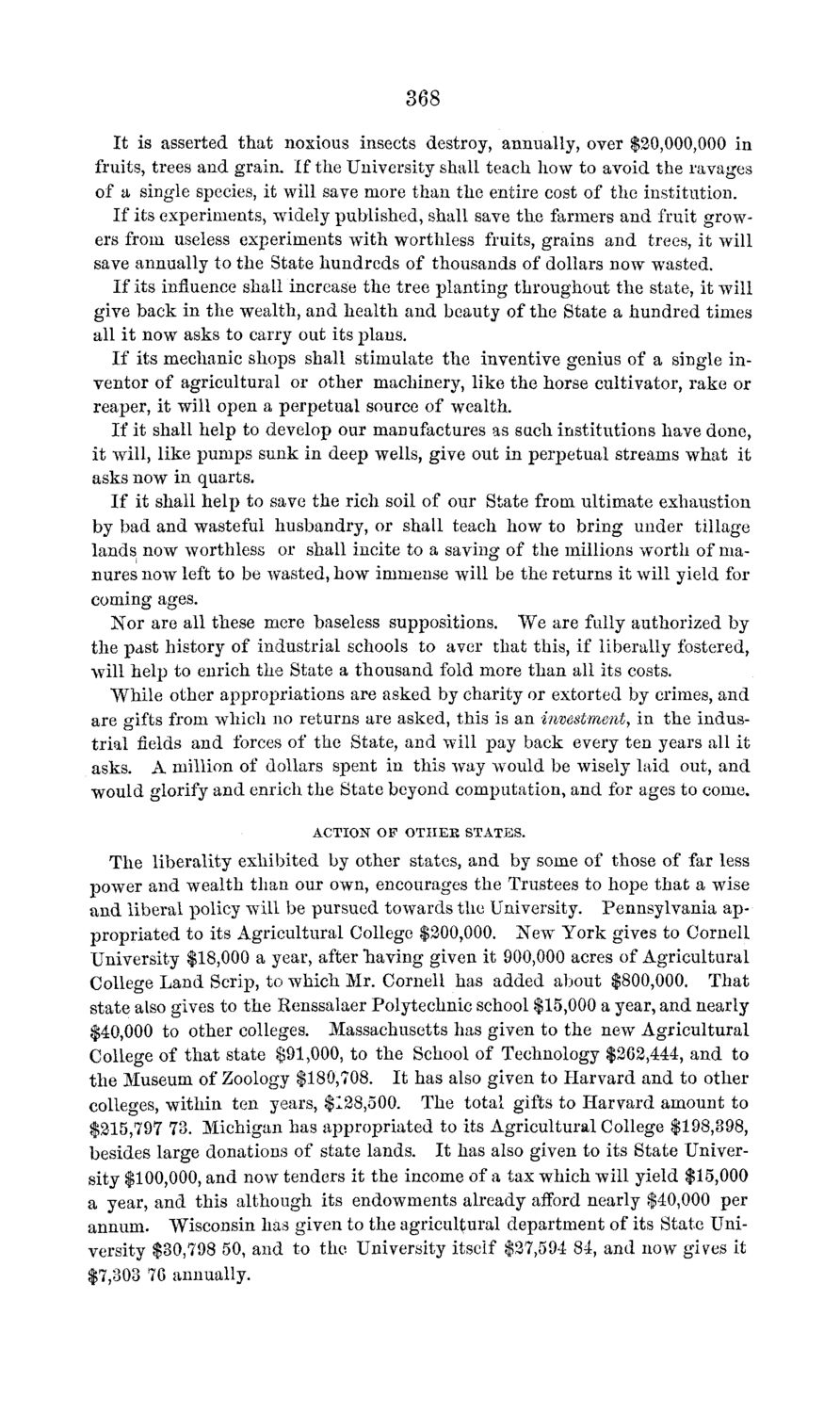| |
| |
Caption: Board of Trustees Minutes - 1869
This is a reduced-resolution page image for fast online browsing.

EXTRACTED TEXT FROM PAGE:
368 It is asserted that noxious insects destroy, annually, over $20,000,000 in fruits, trees and grain. If the University shall teach how to avoid the ravages of a single species, it will save more than the entire cost of the institution. If its experiments, widely published, shall save the farmers and fruit growers from useless experiments with worthless fruits, grains and trees, it will save annually to the State hundreds of thousands of dollars now wasted. If its influence shall increase the tree planting throughout the state, it will give back in the wealth, and health and beauty of the State a hundred times all it now asks to carry out its plans. If its mechanic shops shall stimulate the inventive genius of a single inventor of agricultural or other machinery, like the horse cultivator, rake or reaper, it will open a perpetual source of wealth. If it shall help to develop our manufactures as such institutions have done, it will, like pumps sunk in deep wells, give out in perpetual streams what it asks now in quarts. If it shall help to save the rich soil of our State from ultimate exhaustion by bad and wasteful husbandry, or shall teach how to bring under tillage lands now worthless or shall incite to a saving of the millions worth of manures now left to be wasted, how immense will be the returns it will yield for coming ages. Nor are all these mere baseless suppositions. We are fully authorized by the past history of industrial schools to aver that this, if liberally fostered, will help to enrich the State a thousand fold more than all its costs. While other appropriations are asked by charity or extorted by crimes, and are gifts from which no returns are asked, this is an investment, in t h e industrial fields and forces of the State, and will pay back every ten years all it asks. A million of dollars spent in this way wrould be wisely laid out, and would glorify and enrich the State beyond computation, and for ages to come. ACTION O F O T H E R STATES. The liberality exhibited by other states, and by some of those of far less power and wealth than our own, encourages the Trustees to hope that a wise and liberal policy will be pursued towards the University. Pennsylvania appropriated to its Agricultural College $200,000. New York gives to Cornell University $18,000 a year, after "having given it 900,000 acres of Agricultural College Land Scrip, to which Mr. Cornell has added about $800,000. That state also gives to t h e Renssalaer Polytechnic school $15,000 a year, and nearly $40,000 to other colleges. Massachusetts has given to the new Agricultural College of t h a t state $91,000, to t h e School of Technology $262,444, a n d to the Museum of Zoology $180,708. I t has also given to Harvard and to other colleges, within ten years, $128,500. The total gifts to Harvard amount to $215,797 73. Michigan has appropriated to its Agricultural College $198,398, besides large donations of state lands. I t has also given to its State University $100,000, and now tenders it the income of a tax which will yield $15,000 a year, and this although its endowments already afford nearly $40,000 per annum. Wisconsin has given to the agricultural department of its State University $30,798 50, and to the University itself $27,594 84, and now gives it $7,303 76 annually.
| |